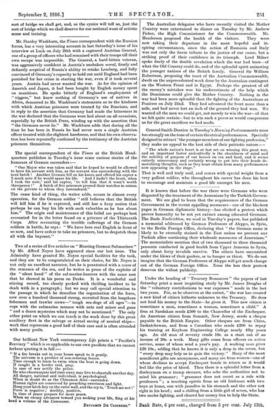Under the heading of " Treasury. Romances " the papers
of last Saturday print a most inspiriting study by Mr. James Douglas of the " voluntary contributions to war expenses " made in the last two years. For, as he observes at the outset, " the war has created a new kind of citizen hitherto unknown to the Treasury. He does not lend his money to the State—he gives it. This new citizen is sometimes a man, sometimes a woman, sometimes a child." A firm at Sandakan sends £500 to the Chancellor of the Exchequer. An American citizen from Summit, New Jersey, sends a, cheque payable to the British Empire. Other cheques are from China, Saskatchewan, and from a Canadian who sends £200 to repay his training at Keyham Engineering College nearly fifty years ago. An old man of seventy sends 108. as a start out of an income of 30s. a week. Many gifts come from officers on active service, some of whom send a year's pay. A working man gives £20 108., adding that he knows it is only a drop in the ocean, but " every drop may help us to gain the victory." Many of the most munificent gifts are anonymous, and many are from women—one of whom declines to accept Exchequer bonds in return as it would feel like the price of blood. Then there is a splendid letter from a donkeyman on a tramp steamer, who asks the authorities not to mind his grammar ; " grammer does not count as a rule with gentlemen " ; a touching epistle from an old Irishman with two boys at home, one with jaundice in his stomach and the other not right in his head ; and a shilling from a little girl of seven, who has two uncles fighting, and cleared her money-box to help the State.






























 Previous page
Previous page